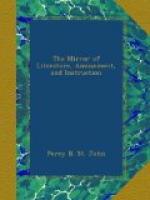Captain Medwin relates Lord Byron’s detestation of Venice in unmeasured terms. He likewise tells of his Lordship performing here one of those aquatic feats in which he greatly prided himself; and the Countess Albrizzi mentions a similar incident: “He was seen, on leaving a palace situated on the grand canal, instead of entering his gondola, to throw himself, with his clothes on, into the water, and swim to his house.”
The Countess, who became acquainted with his Lordship at Venice, also narrates a few particulars of the mode in which he passed his time in that city: Amongst his peculiar habits was that of never showing himself on foot. “He was never seen to walk through the streets of Venice, nor along the pleasant banks of the Brenta, where he spent some weeks of the summer; and there are some who assert that he has never seen, excepting from a window, the wonders of the Piazza di San Marco,[2] so powerful in him was the desire of not showing himself to be deformed in any part of his person. I, however,” continues the Countess, “believe that he often gazed on those wonders, but in the late and solitary hour, when the stupendous edifices which surrounded him, illuminated by the soft and placid light of the moon, appeared a thousand times more lovely.” “During an entire winter, he went out every morning alone, to row himself to the island of the Armenians (a small island, distant from Venice about half a league), to enjoy the society of those learned and hospitable monks, and to learn their difficult language.” During the summer, Lord Byron enjoyed the exercise of riding in the evening. “No sunsets,” said he, “are to be compared with those of Venice—they are too gorgeous for any painter, and defy any poet.”
[1] Letter-press of the superb
“Landscape Annual” for the present
year,
whence our Engraving is transferred. The Life
of the noble
Poet
at Venice cannot be better described than in his own
Letters,
for which see pages 43-82 of the present volume.
[2] From some passages in
his Lordship’s Letters, this would not
appear
correct.
* * * * *
NATURE REVIVING.
(For the Mirror.)
The rills run free, and fetterless, and
strong,
Rejoicing that their icy bonds are broke,
The breeze is burthen’d with the
grateful song
Of birds innumerous: who from torpor
woke,
Cleave the fine air with renovated stroke.
The teeming earth flings up its budding
store
Of herbs, and flow’rs, escaping
from the yoke.
That Winter’s spell had cast around;
and o’er
The clear and sun-lit sky, dark clouds
are seen no more.




